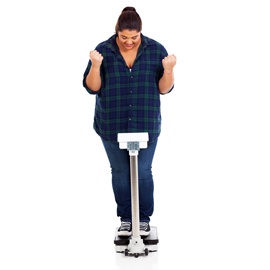How to Get Over a Weight Loss Plateau
August 2013
 Because it gives you the tools and support you need to be successful, medical weight loss can help you achieve steady, dramatic weight loss. But even with the help of a weight loss program, you may find that your progress slows or pauses unexpectedly, and this may mean you’ve come to a weight loss plateau.
Because it gives you the tools and support you need to be successful, medical weight loss can help you achieve steady, dramatic weight loss. But even with the help of a weight loss program, you may find that your progress slows or pauses unexpectedly, and this may mean you’ve come to a weight loss plateau.
Though a weight loss plateau can be a frustrating experience, it doesn’t mean that your weight loss has stopped indefinitely, nor does it mean that your program isn’t working. A weight loss plateau simply means that you need to rededicate yourself to weight loss and reevaluate your approach to ensure that everything you’re doing is as effective as possible.
The Causes of a Weight Loss Plateau
It’s normal for weight loss to slow down at times, especially after an initial rapid drop in weight. As we begin to eat fewer calories, our bodies start to use stored up glycogen as fuel. This also releases water, resulting in significant weight loss due to the loss of fluid.
But as you lose weight, your metabolism will slow down. It will take fewer calories to do the same things than it would at a heavier weight, and this can cause a new equilibrium in which you’re eating the same number of calories you’re using up. To keep moving forward, you need to either reduce the number of calories you’re eating or burn more by becoming more active.
Pushing Past a Plateau
If you’re enrolled in one of our weight loss programs, we’ll do whatever we can to help you continue seeing the best possible results. But if you ever find yourself stuck on a weight loss plateau, you can help yourself get back on track by:
- Sticking to your weight loss plan. No matter what the scale says, don’t give up on the healthy habits you’ve adopted. It’s disconcerting when you don’t lose weight as quickly as you like, but remember that weight loss takes time and dedication. Returning to old habits will only cause you to regain weight and undo the progress you’ve made.
- Taking a minute-by-minute look at your habits. Even if you aren’t stuck at a plateau, it’s a good idea to keep a food and activity journal as you work to lose weight. If you write down exactly what you eat and how you exercise every day, it will make it easier to see patterns that explain why you aren’t losing weight as quickly as before, or habits that need improvement. We can sometimes let detrimental behaviors creep back into our lives unintentionally, so keep an eye out for places in which you may be bending the rules. Apps like MyFitnessPal, which allows you to track both eating and exercise habits, can help with this.
- Increasing activity. Every little bit of exercise will help during medical weight loss. Though exercise alone may not jumpstart your progress, it will help you prevent yourself from sliding backwards, and it can also help you improve your mood and attitude. Remember to consistently challenge your body with new and more intense workouts, and to keep yourself active at every opportunity.
- Adjusting your plan. If you reach a weight loss plateau during a medical weight loss program, speak with us about adjusting your plan to get your results back on track. We can help you change your habits to make it easier to start losing again.
The progress of your weight loss can fluctuate with time, and this doesn’t necessarily mean that you’re doing anything wrong, or that medical weight loss isn’t the answer. If you find yourself stuck at a weight loss plateau, let us know so we can help you find a solution.

